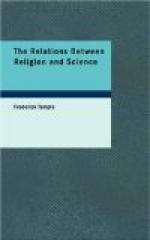For the supremacy of the Moral Law must be a moral, not merely a physical supremacy. In claiming supremacy at all the Moral Law does not assert that somehow by a happy accident, as it were, all things turn out at last in accordance with what is in the highest sense moral. The supremacy of the moral over the physical involves in its very nature an intention to be supreme. It is not the supremacy of justice, if justice is done as the blind result of the working of machinery, even if that be the machinery of the universe. In our very conception of a moral supremacy is involved the conception of an intended supremacy. And the Moral Law in its government of the world reveals itself as possessing the distinctive mark of personality, that is, a purpose and a will. And thus, as we ponder it, this Eternal Law is shown to be the very Eternal Himself, the Almighty God. There is a sense in which we cannot ascribe personality to the Unknown Absolute Being; for our personality is of necessity compassed with limitations, and from these limitations we find it impossible to separate our conception of a person. And it will ever remain true that our highest conceptions of God must fall altogether short of His true nature. When we speak of Him as infinite, we are but denying that He is restrained by limits of time and space as we are. When we speak of Him as absolute, we are but denying that He is subject to conditions as we are. So when we speak of Him as a person, we cannot but acknowledge that His personality far transcends our conceptions. But it still remains the truth that these descriptions of Him are the nearest that we can get, and that for all the moral purposes of life we can argue from these as if they were the full truth. If to deny personality to Him is to assimilate Him to a blind and dead rule, we cannot but repudiate such denial altogether. If to deny personality to Him is to assert His incomprehensibility, we are ready at once to acknowledge our weakness and incapacity. But we dare not let go the truth that the holiness, the justice, the goodness, the righteousness, which the Eternal Moral Law imposes on us as a supreme command, are identical in essential substance in our minds and in His. Indeed, the more we keep before us the true character of that law, the more clearly do we see that the Moral Law is not His command but His nature. He does not make that law. He is that law. Almighty God and the Moral Law are different aspects of what is in itself one and the same. To hold fast to this is the fullest form of Faith. To live by duty is in itself rudimentary religion. To believe that the rule of duty is supreme over all the universe, is the first stage of Faith. To believe in Almighty God is the last and highest.




